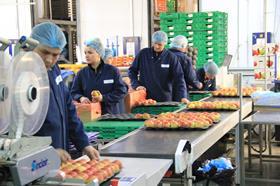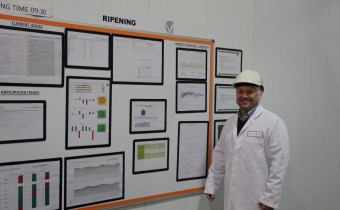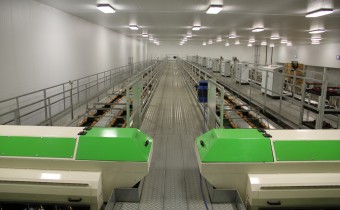
The fields around Lincolnshire may be flat as far as the eye can see, but the same monotony cannot be said of the region’s produce businesses.
Diversity is around every corner, as multi-million pound global suppliers such as Univeg and Worldwide Fruit sit alongside longstanding Lincolnshire stalwarts Allium Alliance and two-person operations such as KFF Potatoes.
Each company has a unique story to tell, but also fits into the wider jigsaw that makes this region not only one of the country’s most historically important, but also one of the UK’s most interesting fresh produce regions.
KFF Potatoes
Down an all-but-deserted lane at the side of an estuary river, you find KFF Potatoes, which encompasses directors Richard Phillips and Patrick Login. Both men have their roots firmly in the produce industry – Phillips cut his teeth at Greenvale alongside Fresca CEO Ian Craig, before working at Branston, Anglian Produce and Nationwide, while Login worked at the company that became QV Foods, and Fenmarc, before joining KFF. With such a small operation, Login explains how they are both very hands-on and can speak to retailers on the phone, help out in the packhouse or drive a forklift should the need arise.
The company itself started life as Kingsley Fruit Farms – a strawberry grower co-operative that was established in 1946 in Surrey, before relocating to Lincolnshire in the 1960s and moving into potatoes. With a core of 22 growers, the company packs for smaller independents, rather than major retailers, and counts Musgrave, parent company of Londis and Budgens, as its main customer.
Through a deal at Southampton wholesale market, the firm also supplies potatoes to all the cruise liners leaving from that port, and does contract packing for third parties – a business that is helped by the fact that KFF is equipped to pack BRC Grade A products. Phillips says: “Customers like that they can ring up and speak straight to a decision maker. This makes us able to react quickly, so if they want something changing we can say yes or no immediately without having to track down the right person.”
The potato industry has been tense in recent months, as an oversupply has pushed prices down, affecting those on fixed-price contracts. It’s at times like these that Login says the company benefits most from not using traditional contracts. Instead the firm uses “formal crop agreements” that take into account tonnage, type of potato, and timing, backed up with a contingency plan.
Nene Potatoes
A potato firm that is closer to the larger packers and major retailers is marketer Nene Potatoes – a grower co-operative of 27 members, which supplies 120,000 tonnes a year to the packing and processing industry. Two years ago the company invested in a new quality control facility and showroom, meaning it can now demonstrate the shelf life of products to both customers and suppliers, something that MD Paul Shepherd says helps to “avoid disappointment”.
Manor Fresh
Hidden down a drive that seems to goes on forever, Manor Fresh prefers to remain as quiet as its tucked away location. But managing director Mike Scott was happy to tell FPJ about some of the company’s most recent achievements, including becoming the proud recipient of M&S’ Silver supplier accreditation, which looks at ethical, environmental and manufacturing capabilities of key M&S food suppliers.
“Our focus is on growing the M&S fresh vegetable business, through quality and availability,” says Scott. “We made a significant investment in a potato packhouse refurbishment last year, which is now fully operational, and it is something we are quite proud of.”
The company was formed in April 2006, as a joint venture between Fresca and Bakkavor/QV Foods. Potatoes are the company’s biggest line, but it also supplies vegetables, brassicas and a small range of organics to M&S and other retail and foodservice customers.
“There is a real problem with proliferation on varietal development in potatoes, and any new introductions have to bring something to the party,” Scott says. “We maximise our supply of British potatoes, but quality is key so we have a longer import season than others.”
Univeg UK
From potatoes to fruit, Spalding is home to two of the UK’s most significant fruit suppliers. Univeg UK is based across three sites: a facility on Stephenson Avenue, in Spalding, handles tropical fruit, stonefruit and dried fruit, with facilities including heat-seal packing, wrapping, avocado grading equipment, and ripe and ready-to-eat avocado pressure
equipment.
The company’s most significant recent investment was the acquisition of Empire World Trade (EWT), across the road, and it also has an apple-grading facility at Clay Lake, in Spalding Marsh. The company is now in the process of merging the management of daffodil producer Winchester Growers, acquired in 2000, which is currently spread across three sites, and which supplies 75 per cent of the UK daffodil market.
“The dried fruit sector is going really well, and the company is a key part of M&S and Morrisons’ supply,” says marketing manager Rosemary Lalley. “Tropical and stonefruit continue to grow, and ripe-and-ready avocados and mangoes are also key areas of growth. There is such a difference between the strategy among discount and premium retailers – we supply M&S and Waitrose, who are still promoting innovation and quirky things, whereas the discounters are very focused on price.”
Worldwide Fruit
In a smart moment for produce, Worldwide Fruit has taken a leaf out of the notoriously sophisticated supply chains in the automotive and aerospace industries by implementing the lean system of management. The result is that a tour of the recently expanded cold store and packing facilities feels like walking through a very well-organised and systematic community classroom.
There are whiteboards on every wall with flow charts, project teams and motivational phrases, while employees withdraw to a designated problem-solving room to trace the background to any issue that arises using mind maps and team discussions.
Operations director Neal Collishaw, who is responsible for overseeing the transformation to lean, explains: “We are investing heavily in bottom-up training. The idea is we want to engage hearts and minds – we are very much a learning business and a problem-solving business.”
Collishaw, who has been at the company for 20 years, himself embodies the driving principles by making the journey from printing delivery notes for lorry drivers as a dispatch clerk to company director. Technical director Tony Harding has had a similar journey, starting out as a quality controller, so Collishaw says they both see the value in encouraging staff retention.
Worldwide Fruit’s Spalding facility now houses 10 ripening rooms for avocados and pears, including what the company believes is the UK’s largest pear-ripening facility, and supplies ready-to-eat lines to retailers including Waitrose, M&S and Sainsbury’s. While its primary customer is M&S, the company supplies six retailers, including 100 per cent of Asda’s avocado business.

Freshtime
In recent months, vegetable and snack specialist Freshtime’s recruitment drive has hinted of its optimism and ambition for the future. Managing director Mark Newton explains: “The overarching story for us is growth. We are growing the business, and in particular we are looking to grow the convenience side, and we’re doing a lot of work with consumers.”
Newton, whose background as MD of salad brand Florette means he is more than equipped for the role, says prepared produce has been static in recent years, as a result of being driven by product rather than consumers. Through hosting consumer focus groups, Newton says the company found out that consumers don’t prioritise traditional carrot batons, which typically resulted in high levels of waste at factory level, meaning it was suddenly able to minimise its wastage.
The company’s expanding team of development chefs are dedicated to Newton’s other vision for prepared produce – to find the middle ground between too basic so there is no value, and too processed that it puts the consumer off – while the in-house agronomy team means Freshtime can go direct to growers. “One of our points of difference is we process everything here ourselves. We make fresh dressings and flavoured butters in-house. At some point we may need an extra site, but there is some capacity here to expand.”
Elsoms Seeds
At the other end of the spectrum to processing, Spalding breeder Elsoms Seeds explains where the future opportunities for growth in seeds are, and why it is developing its focus on niche vegetables. Melanie Ebbage, communications manager, says: “Although our main lines are brassicas, root crops and alliums, we are also working hard in diverse crops such as celery.'
Recently the company appointed Marie Laure-Bayard as its asparagus specialist, who has joined from neighbouring breeder Hargreaves Plants, and who will now work closely with the company’s Dutch breeding partner Bejo on the asparagus breeding programme. Most of the vegetable varieties Elsoms sells are bred by Bejo, but the company also breeds its own swedes and parsnips, sells vegetable seeds and offers seed treatment processes to third parties.
Oldershaw Group
The family-run Oldershaw Group is a grower, packer and processor of onions, garlic and shallots. As the largest company within the group, Moulton Bulb Company packs product from growers who are based across the UK from Norfolk up to Scotland.
The company’s showcase investment is a recently-installed Near Infra Red grader, made by Italian company Longobardi, which can detect internal defects within the onion bulb. “This process used to be managed by sampling, but we can make a massive impact on that risk now and we are already seeing the results,” says director Chris Woodrow. “We will pass on the information to our grower base, which will have long-term benefits by taking the volatility out of the supply chain.”
The grader, which even with funding from a Defra grant still made it the company’s single largest investment, is the first of its kind in the UK to be used on onions. As the technology becomes more available the price is coming down, Woodrow says, and it has enabled the company to halve the labour used on grading, with an approximate payback time of seven years. Woodrow adds: “We are very proud of it. We’ve gone from between 16 and 17 tonnes an hour up to the mid 30s and 40s. It’s certainly transformed our business.”

Allium Alliance
Established 17 years ago, Allium Alliance is headed up by industry stalwart Malcolm Gray, who has been in the trade for 35 years. The company supplies the processing and industrial peeling sectors, for products including soups, sauces and pies, with a customer base that covers pre-packers, wholesalers, foodservice, caterers and processors.
In volume terms, the company turns over around 30-35,000t a year, and it offers year-round continuity, by supplementing the English supply from Spain, Chile, Egypt, New Zealand and the Netherlands when necessary. With a team of four in the Spalding marketing offices, Gray says the company’s point of difference is that, due to its size, it is able to react very quickly.
“We are loyal to our current customer base, and our future growth will come from increasing in the sectors where we are already operating,” he says. “Where we can offer benefit to our customers is knowledge and year-round availability.”
Gray, who is also a founding member of the British Onion Association, says the onion market is currently depressed, following a record 2014. “The harvest was good with good quality across Europe, so the prices are down. Growers are now planting and drilling for the 2015 season, and we are hoping for a more balanced harvest.
“Imports are still the biggest challenge facing the industry, and we have to deal with that. The UK is 50 per cent self-sufficient in onions so there is room for movement, although the grower base is fairly stable at the moment,” he says.



